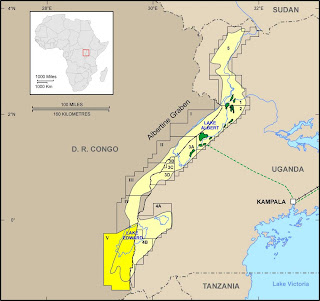 |
| Virunga National Park is an important home for endangered mountain gorillas |
The Democratic Republic of Congo has suspended all oil exploration in Virunga National Park, Africa's oldest national park, blocking attempts by British oil company Soco to search for oil there, the government said on Thursday 17th March.
Soco, and its partner Dominion Petroleum, hold rights to a block on the DRC's border with Uganda, which they were awarded by presidential decree last year. Soco, who is the operator, submitted an environmental impact assessment plan last week, but Congo's environment minister Jose Endundo said in an open letter to environmentalists, dated 14th March, that all oil exploration within the park was suspended.
"We have rejected the recommendations of an environmental impact assessment conducted by the oil company, Soco, which we consider premature, superficial and does not conform to the standards we expect," the minister said in the letter.
Virunga national park is home at approximately 200 of the 700 remaining mountain gorillas and a number of other endangered species. It is on the UN's list of World Heritage sites in danger, and UNESCO has repeatedly warned against oil exploration in the area.
 |
| Soco and Dominion hold the dark yellow block, while Dominion holds the block opposite, in Uganda. |
Dominion Petroleum holds the block directly across the border in Uganda, and they had previously been planning on carrying out cross-border seismic work. Whether or not this will still go ahead is not clear.
Soco's chief executive Roger Cagle told the BBC that oil exploration would continue on the Ugandan side of the border regardless of the Congolese decision.
The area in eastern DRC is also home to numerous armed groups who continue to operate across the porous border with Uganda. The Democratic Forces for the Liberation of Rwanda (FDLR) rebel group is very active in the area, and are believe to be responsible for the deaths of three park guards and five solders in January 2011.
Sources: BBC, Reuters Africa, UNESCO

No comments:
Post a Comment